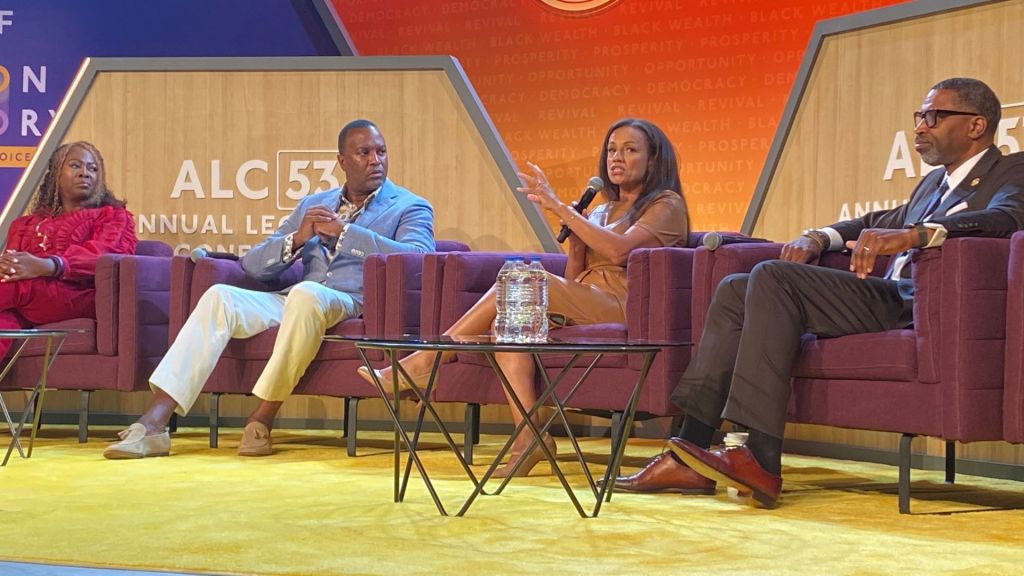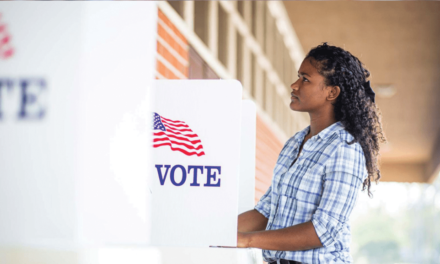By Tashi McQueen
AFRO Staff Writer
tmcqueen@afro.com
Democracy in America and closing the racial economic wealth gap were topics of discussion on Sept. 12 at the Congressional Black Caucus Foundation’s (CBCF) 2024 Annual Legislative Conference (ALC).

Day two of the event kicked off with a National Town Hall under the theme “Pathways to Prosperity: Advancing Democracy and Black Economic Opportunity.”
The event was hosted by veteran journalist and moderator Don Lemon and included Dr. Michael McAfee, president and CEO of PolicyLink; LaTosha Brown, co-founder of the Black Voters Matter Fund; Alexis McGill Johnson, president and CEO of Planned Parenthood Action Fund and Planned Parenthood Federation of America; and Derrick Johnson, president and CEO of the NAACP.
Legislators, top officials and leaders from around the country, including Maryland Gov. Wes Moore (D), attended the two-part town hall to discuss the state of American democracy and explore ways to increase access to economic opportunities for Black Americans.
“There is a huge disparity in terms of wealth between the Black community and the majority community, and we know it is our obligation to do what we can to close that gap,” said Nicole Austin-Hillery, president and CEO of the CBCF. “ is a moment for us to use our collective and collaborative thinking and strategies to make a difference.”
Austin-Hillery encouraged attendees to “figure out how each of you, in your own communities, in your own jurisdictions, can be leaders right where you sit.”
Moore fired up the crowd with powerful remarks on why and how the racial economic wealth gap should be closed and what he’s doing in Maryland to slash poverty and create economic equality.
“We didn’t have, in our state, an 8-1 racial wealth gap because one group is working eight times harder,” said Moore. “If you do not understand things like racist procurement policies and how government dollars are being used to support some and not others, then you cannot understand why this gap exists in the first place.”
Moore detailed victories won in the fight to eliminate economic disparities in Maryland.
“We’ve been able to raise minimum wage,” he said, “Because gone should be the days when you have people who are working jobs– and in some cases multiple jobs– and still living at or below poverty line. We’ve been able to pass the most aggressive housing package in the history of the state of Maryland, turning renters into homeowners.”
Moore emphasized that policy matters when it comes to economic opportunities for African Americans. Still, he acknowledged that this was not enough.
“We will not make progress with policy alone,” said Moore. “We’re going to need everybody involved in this conversation.”
Moore highlighted that “this country has lost $16 trillion in GDP (Gross Domestic Product) over the past two decades because of the racial wealth gap.”
“Racism is expensive, bigotry is expensive,” he said.
Moore vowed to use every day left of his first term as governor to work towards economic equality.
“Our time in these seats are temporary,” he said, addressing the conference audience. “We’re not going to waste a minute.”
Democracy in America
Panelists of the town hall answered questions from Lemon regarding solutions to the democracy issues faced by Black America and the country as a whole.
“What happens to a nation when the population that it never loved becomes the majority?” quipped Dr. Michael McAfee, president and CEO of PolicyLink. “We haven’t really designed our institutions and our systems for the multi-racial democracy we have. In too many instances, we haven’t shown the intellectual and the applied interest to do that work.”
“It’s unsexy work,” said McAfee, “But it’s foundational work. That’s what nation building work looks like.”
Derrick Johnson said “work, not rhetoric” will help ensure African Americans advance regardless of the general election results this year.
Derrick Johnson spoke on solutions to the problem.
“If we’re saying that economic advancement is through home ownership, we have to chart out how to get there,” he said.
Johnson said loan forgiveness was one avenue of helping African Americans buy homes by putting dollars back into their pockets.
Through revisions to the PSLF, $5.2 billion was forgiven for 66,900 borrowers, according to the U.S. Department of Education.
Derrick Johnson said this “opens up the ability for individuals to get into home ownership.”
Still, it seems as though as soon as one battle is won, another rages on.
“Private equity firms are buying up lots of homes to create permanent home renters,’ said Derrick Johnson. “We have to revise public policies to prevent that so we can get into the game.”
Rep. Troy Carter (D-La.-02), ALC honorary co-chair, echoed Johnson’s sentiment.
“Today’s conversation isn’t just about identifying problems, it’s about finding real, tangible solutions,” said Carter. “It’s time to push the policies that expand access to capital for Black entrepreneurs…invest in education and workforce development and create affordable job options.”
“We need to dismantle the systems of discrimination in hiring, lending and tax practices,” said Carter. “We must ensure that Black Americans have a seat at the table- or seats- at the table when decisions that shape our economy, shape our future and shape our lives are being had.”
The post Leaders discuss democracy in America, closing racial economic wealth gap at Black legislative conference appeared first on AFRO American Newspapers.











